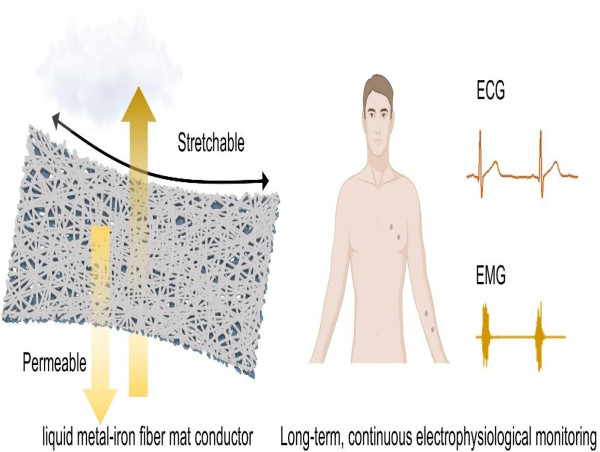GA, UNITED STATES, February 27, 2025 /EINPresswire.com/ -- In a ground-breaking first, researchers have fabricated a highly elastic, permeable liquid metal–iron fiber mat conductor with exceptional stretchability, electrical conductivity, and recyclability, demonstrating its potential for long-term electrophysiological monitoring in healthcare applications.
With the rapid advancement of wearable technologies, the mechanical properties of stretchable electronics have greatly improved, driving the development of robust electronic interfaces for sensing and stimulation. This progress has expanded the range of applications, particularly in health monitoring, human-machine interfaces, and robotic prosthetics. However, despite these advancements, designing stretchable conductors that simultaneously offer high conductivity, stretchability, and long-term wearability remains a challenge.
In a study published in the KeAi journal Wearable Electronics, a group of researchers from China and Israel has designed a novel conductor-a highly elastic, permeable liquid metal-iron fiber mat conductor-capable of long-term, continuous, and high-fidelity electrophysiological monitoring.
"Liquid metal-based stretchable conductors have garnered much attention for their broad applications in bioelectronics, wearable devices and soft robotics," explains one of the study's authors, Yan Wang, a professor in the Department of Chemical Engineering at Guangdong Technion-Israel Institute of Technology. "However, their high surface tension and weak interfacial bonding with most elastomers complicate their seamless integration into flexible or stretchable devices. Furthermore, conventional liquid metal-based conductors often lack sufficient permeability, leading to poor moisture management and discomfort during prolonged wear."
The team found that by coating a mixture of liquid metal and iron powder onto fiber mats, conductors with exceptional stretchability, high conductivity, and outstanding electromechanical stability were achieved.
“These conductors are capable of long-term, continuous, high-fidelity electrophysiological monitoring, highlighting their potential applications in early disease detection, bioelectronics, and wearable health monitoring systems,” adds Wang.
Until now, the recyclability of liquid metals has remained limited, and the combination of complex fabrication processes and suboptimal breathability has posed significant challenges for their practical application in epidermal electronic devices.
“Our newly proposed approach demonstrates that high-performance conductors can be achieved through a simple fabrication process while maintaining full recyclability," says Wang. "We hope that our findings provide a new perspective for the development of stretchable conductors with high conductivity, biocompatibility, breathability, and recyclability to contribute to the development of novel wearable health monitoring technologies and other bioelectronic devices."
DOI
10.1016/j.wees.2024.12.006
Original Source URL
https://doi.org/10.1016/j.wees.2024.12.006
Funding information
This research was supported fr the Natural Science Foundation of China (grant No.: 52303371), Guangdong Science and Technology Department (grant No.: 2021B0301030005, STKJ2023075, 2022A1515110209), Guangdong Education Department (grant No.: 2022KQNCX112), Seed Fund (GCII-Seed-202406) from GTIIT Changzhou Innovation Institute, and the Key Discipline (KD) Fund, the Technion, and the Start-Up Fund from Guangdong Technion.
Lucy Wang
BioDesign Research
email us here
Legal Disclaimer:
EIN Presswire provides this news content "as is" without warranty of any kind. We do not accept any responsibility or liability for the accuracy, content, images, videos, licenses, completeness, legality, or reliability of the information contained in this article. If you have any complaints or copyright issues related to this article, kindly contact the author above.
![]()




